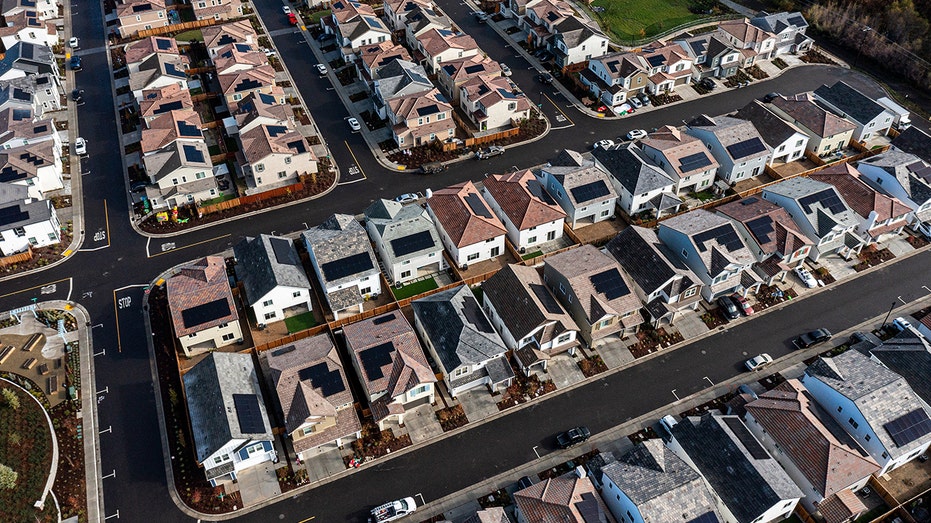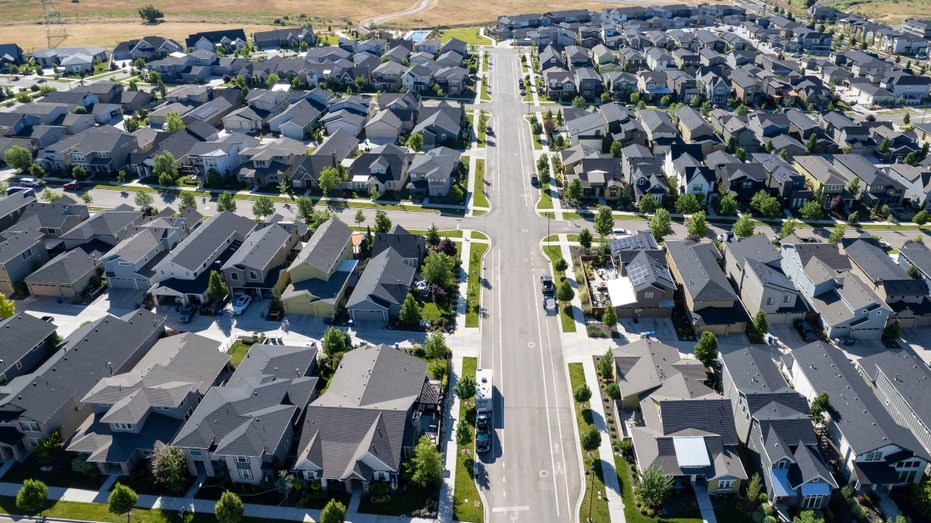A tale of two housing markets: prices fall in the West while the East booms
In an unusual pattern, the 12 major housing markets west of Texas, plus Austin, saw home prices fall in January, while the opposite happened in the rest of the country
Katrina Campins breaks down 'confusing' real estate, mortgage numbers
'Mansion Global' host Katrina Campins discusses the mortgage rate roller coaster and the impact of Silicon Valley Bank's closure on the real estate market.
The United States is a country of two housing markets. In one, home prices are falling from a year ago. In the other, they’re still posting annual gains. That division runs right down the center of the U.S.
In all of the 12 major housing markets west of Texas, plus Austin, home prices fell in January on an annual basis, according to mortgage-data firm Black Knight Inc.’s home-price index. In the 37 biggest metro areas east of Colorado, except Austin, home prices rose year-over-year.
This pattern of geographical disparity is highly unusual, if not unprecedented, housing analysts say. "We’ve never seen anything quite like this where it’s so stark, west to east," said Andy Walden, vice president of enterprise research strategy at Black Knight.

Homes in Rocklin, California, US, on Tuesday, Dec. 6, 2022. A record number of homes are being delisted as sellers face a sharp drop in demand, according to real estate brokerage Redfin. Photographer: David Paul Morris/Bloomberg via Getty Images ( Photographer: David Paul Morris/Bloomberg via Getty Images / Getty Images)
Home prices are falling in the West, while prices in the East are increasing.
HOUSING MARKETS IN TECH HUBS ARE COOLING FASTEST AS TURMOIL IN SECTOR PERSISTS
After more than two years in which the pandemic-driven housing boom and low mortgage rates boosted prices in every corner of the U.S., from big cities to small towns, the country’s housing markets are now diverging, responding increasingly to local factors such as affordability, supply and job growth.
Certain housing markets in the West have enjoyed long price run-ups since the 1990s, when the rapid growth of the technology industry fueled a housing market boom. Now, the cities most closely associated with tech have the fastest falling home prices. San Jose, Calif., and San Francisco home prices were down more than 10% from a year earlier in January, and Seattle prices fell 7.5%.
In the Eastern half of the U.S., Florida and other Southern markets are still attracting companies and adding jobs. Orlando home prices were up 9.3%, while Miami prices rose 12%, the top increase among the 50 biggest metro areas. A slew of financial companies moved to Miami in 2021 and 2022, and their employees are still arriving, said Judy Zeder, an agent with the Jills Zeder Group at Coldwell Banker Realty in Miami.
FLORIDA'S RED-HOT REAL ESTATE MARKET COOLING DOWN: 'GONE ARE THE DAYS OF' BIDDING WARS, BROKER SAYS
"We still have a lot of buyers who are here that we still can’t find homes for," she said.
In places such as Hartford, Conn., and Buffalo, N.Y., more affordable homes and limited housing supply supported annual price gains around 8% in January.
"The uptick in interest rates does not seem to have had any effect on our market," said Lisa Barall-Matt of Berkshire Hathaway HomeServices New England Properties in West Hartford, Conn. Housing markets in the state lagged behind most of the country for years following the housing crisis. She said the area’s relative affordability compared to Boston and New York is now keeping demand strong.
Alison and Dylan Conway, who are expecting their first child in May, are moving from Maryland to Connecticut to be closer to family. They lost out on three offers in the Hartford area to higher bidders before having their fourth offer accepted for a three-bedroom house in East Hampton, Conn.
"We really didn’t think that it was going to be so competitive," Ms. Conway said. "We went to several open houses in Connecticut, and there were 20 cars packed outside the second it opened. It was wild."
Existing-home sales rose in February, snapping a 12-month streak of declines, the National Association of Realtors said last week. The median existing-home sale price fell 0.2% in February to $363,000, the first year-over-year decline in 11 years.
SILICON VALLEY BANK COLLAPSE WILL 'DEFINITELY' IMPACT REAL ESTATE, DEVELOPER WARNS
Many economists expect home prices to fall further on an annual basis this spring or summer, as Western markets continue to slide and some Eastern markets start posting year-over-year declines. Metro areas in the Southeast that experienced big price run ups in recent years such as Nashville, Tenn., or Raleigh, N.C., are especially vulnerable to price declines, analysts say.
The housing market is at a pivotal moment heading into the crucial spring selling season. Declining mortgage rates in December and January spurred a pickup in activity, but some of the momentum halted in February as rates started to climb again.
The average rate on a 30-year fixed mortgage was 6.42% last week, down for the second straight week but up from 6.09% in early February, according to Freddie Mac. The Federal Reserve approved its ninth consecutive interest-rate increase Wednesday and said it was too soon to tell how recent turmoil in the banking industry could slow the economy.
The metro areas posting the biggest price declines tend to fall into two categories: markets where prices skyrocketed in recent years as people moved in from other states, such as Phoenix and Austin, and markets where prices didn’t surge as dramatically during the boom but that were already prohibitively expensive, such as San Francisco and Los Angeles, said Black Knight’s Mr. Walden.
The hard-hit California markets have long been some of the nation’s priciest. Housing costs up and down the West Coast surged in the 2010s as the tech boom generated new high-paying jobs and enormous wealth. San Francisco home prices rose 112% between January 2012 and January 2020, outpacing a national 58% gain in that period, according to S&P Dow Jones Indices.

An aerial view of the San Francisco city skyline in California, Oct. 28, 2021. (REUTERS/Carlos Barria / Reuters Photos)
The median existing single-family home-sale price in San Francisco was $1.465 million in February, down from a peak of $2.06 million in March 2022, according to the California Association of Realtors. West Coast markets have also long been supply constrained due to high land costs and regulations on new-home construction.
As home prices hit new highs in 2021 and early 2022, these markets became even less affordable. In Los Angeles, about 63% of the area’s median household income would be needed to make mortgage payments on the average priced home in January, according to Black Knight.
Laura Johnson, a 59-year-old technology project manager, put her Seattle house on the market in September for $800,000. In October, after dropping the price to $745,000 and getting no offers, she took the house off the market.
"In Seattle, sales just completely dropped off," she said.
Ms. Johnson relisted her home in February for $750,000. "I was very cautious about putting it back on," she said.
She cut the price to $740,000 last week. If she sells her home, Ms. Johnson plans to move to Florida.
Seven of the 10 least-affordable markets in January were in the West, including San Francisco, Seattle and Los Angeles, according to Black Knight.
Along with those, the quickest areas to slow down when mortgage rates rose in 2022 were the "Zoomtowns"—the metro areas that experienced rapid population growth during the pandemic as remote workers and retirees moved to lower-cost housing markets.
The housing markets in cities such as Boise, Idaho, Phoenix, and Austin had become flush with money from out-of-state buyers and less affordable to those with local incomes. As rates climbed, demand slowed sharply, weighing on prices.
FIRST-TIME HOMEBUYERS BATTLING RAPID DECLINE IN AFFORDABILITY: NUMBERS 'JUST NOT WORKING'
The median home-sale price in Idaho’s Ada County, which includes Boise, was $492,115 in February, down 10.5% from a year earlier, according to Boise Regional Realtors. That price is almost $130,000 above the median price nationally, making it unaffordable, or at least less of a bargain, for many out-of-state buyers.
"Now you have to have some other compelling reasons why you are looking at the Boise market other than just pricing,"said Debbi Myers, president of Boise Regional Realtors. That’s good news for local shoppers, who are facing less competition, she said.
Nearly all the frothiest housing markets going into last year were West of the Mississippi River. In January 2022, an analysis from Florida Atlantic University and Florida International University named Boise, Austin and Ogden, Utah, as the most overvalued housing markets in the U.S. Eight of the top 10 most overvalued markets that month were in the West, Mountain West or Texas.

Houses in the Harris Ranch community of Boise, Idaho, US, on Friday, July 1, 2022. (Photographer: Jeremy Erickson/Bloomberg via Getty Images / Getty Images)
This year, some of the most stretched prices can be found further east, a sign that prices in these markets may turn negative on an annual basis soon. In January, the analysis found Atlanta, Cape Coral, Fla., and Charlotte, N.C., were the most overvalued, based on how far prices have risen above their long-term pricing trends.
The top 10 were all in the South and Midwest.
"Markets are overpriced," said Ken H. Johnson, a real-estate economist at FAU, but "they’re not as overpriced as the markets a year ago."
Even with more price declines expected, lower-than-normal supply of homes for sale is one reason that economists and market participants say the current housing slump won’t bring the national price collapse that followed the subprime crisis.
The U.S. had a low inventory of homes for sale heading into the pandemic and the number of active listings is still well below pre-pandemic levels.
Home builders have been hampered by supply-chain issues and labor shortages. Most homeowners with mortgages have a current rate below 4%, and many don’t want to give up their current rate and pay a higher rate for a different house. Many homeowners are also sitting on large cushions of equity, which is likely to prevent a big wave of foreclosures and distressed sales.
CLICK HERE TO GET THE FOX BUSINESS APP
"Home prices absolutely are going to drop" in many markets, said Matthew Gardner, chief economist at Seattle-based brokerage Windermere Real Estate. But "the only time you see a significant decline in home values is when you see significantly more supply than you do demand, and that is not going to happen."
Joe Stanich and Cait Peltyszyn started looking to buy a house in northern New Jersey in December, but they were discouraged by the lack of inventory and the persistence of higher borrowing costs.
The couple had an offer accepted on a two-bedroom home this month, but the seller backed out to accept a higher competing bid, Mr. Stanich said.
"It is frustrating," he said. "Any talk of the market coming back to reality, or at least cooling off, coming down, is not playing out in this area."




















